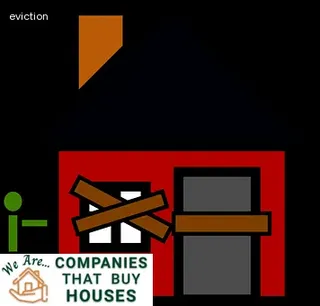In Illinois, a person claiming adverse possession of land must meet certain requirements that must be filed in court. The claim is based on actual and visible possession of the real property for an uninterrupted period of twenty years or more.
The individual claiming adverse possession must have been occupying the land with the intention to possess it and must have done so openly and notoriously, meaning that the occupancy was known by others. Additionally, the claimant must prove that they’ve paid taxes on the property under their name for the last seven years before filing their claim and have had exclusive possession of it during that time period.
Finally, they must demonstrate that they acquired title to the property through continuous use and not through any purchase or agreement with previous owners. All these requirements need to be met in order to successfully file a claim of adverse possession in Illinois.

In Illinois, squatters can be legally evicted from a property by the landlord in accordance with tenant-landlord laws. The first step is to notify the squatter that they are unlawfully occupying the property and must vacate the premises immediately.
If they fail to comply, then a complaint may need to be filed in court to begin an eviction proceeding. During this process, the landlord must prove that the squatter has no legal right or claim to the property, which could include providing proof of ownership or lease agreement.
Once a court order is issued, law enforcement officers can be called upon to enforce it if necessary. Additionally, landlords should take care to observe all relevant laws during this process, such as providing adequate notice and avoiding self-help evictions.
As a homeowner, it is important to know the laws and rights that pertain to landlord-tenant relations if you wish to protect your property from unauthorized occupants. Squatters must be evicted in accordance with Illinois state law, but understanding what defines a squatter and the legal process for eviction can help make this process smoother.
Homeowners should familiarize themselves with the relevant statutes, such as the Forcible Entry and Detainer Act (735 ILCS 5/9-101 et seq.), which allows landlords to regain possession of their premises through a court order.
Additionally, homeowners should review their rental agreements or leases to ensure they are in compliance with all applicable landlord-tenant laws before attempting eviction. Finally, homeowners should be aware of any steps they may need to take after an eviction is successful, such as filing for damages in civil court or recovering unpaid rent.
Knowledge of these steps will ensure that homeowners are well protected against unauthorized occupants.

In Illinois, adverse possession laws are relatively strict and do not allow for many exceptions. However, there are a few ways in which a squatter may be able to successfully claim ownership of land through adverse possession.
For example, if the squatter can prove that they have been using the land openly and without interruption for at least 20 years, they may be able to establish title to the property. In addition, if a squatter can demonstrate that they have made improvements to the land and paid taxes on it over the past 20 years, they may be eligible to gain title to the property.
Furthermore, if an individual has been living on public land or state-owned land for more than 5 years and can prove that they have been using it as their primary residence during this time period, they may be able to gain title to the property through adverse possession in Illinois. Thus, while exceptions do exist within Illinois' adverse possession laws, these exceptions must be proven with substantial evidence in order for a squatter's claim of ownership to be legitimate.
When it comes to exploring squatter's rights in Illinois, one of the most important questions is whether a squatter is entitled to any benefits or compensation. Generally speaking, squatters do not have any legal rights and are not protected by Illinois landlord-tenant laws.
This means that unless a squatter has been granted permission by the property owner to occupy the dwelling with written documentation, they are considered to be trespassing. As such, they cannot expect any compensation from the landowner for their time occupying a property illegally.
Squatters may also be subject to fines, eviction notices, and even criminal charges depending on the situation. Furthermore, if squatters occupy a property for an extended period of time without permission it may be difficult for them to find another suitable place to live due to their lack of rental history or financial background checks.
Therefore, it is important for all individuals considering squatting in Illinois to understand that there are no inherent benefits or protections afforded by law and that they could potentially face severe consequences if caught.

In Illinois, the Color of Title Doctrine is a law that applies to landlords and tenants. It states that if a tenant has been in possession or occupancy of the property for more than seven years and has made improvements on the land, they have an argument that they are entitled to title or ownership of the property.
If a tenant can prove they have fulfilled all the requirements, then they may be able to obtain legal title to the land. The doctrine can also be used by tenants who are facing eviction from their landlord in order to protect their rights and interests.
In order for tenants to use this doctrine, however, it must be proven that there was an agreement between them and their landlord that allowed them continued occupancy of the premises for seven years or more without any interruption or disturbance. Additionally, they must show that they had acted as though they owned the property by making improvements on it such as repairing structures and improving its condition over time.
When it comes to finding affordable home and car insurance in Illinois, there are a variety of options available. For those who own their own homes, basic homeowner's insurance is essential for protecting the structure from fire, theft, and liability.
There are also additional coverage options such as flood insurance to provide protection against water damage or windstorm coverage for severe weather events. When it comes to car insurance, Illinois law requires drivers to have minimum liability coverage that includes bodily injury and property damage.
This can be supplemented with collision and comprehensive policies for more complete protection. Additionally, some insurers may offer discounts for bundling multiple policies together or having a good driving record.
It is important to shop around when selecting an insurer in order to find the best combination of coverage and affordability.

In Illinois, there are a number of resources available for individuals looking to learn more about their squatter's rights. The best place to begin is by consulting the landlord-tenant laws outlined in the Landlord and Tenant Act of Illinois.
This act outlines the rights and obligations of both landlords and tenants, including the right to possession of a property after a reasonable amount of time has passed since the tenant moved out or abandoned it. Additionally, it is important to understand applicable local regulations which may impact your rights as a squatter, as they may vary from one municipality to another.
Those who need further information can contact their local housing authority or reach out directly to an attorney specializing in landlord-tenant disputes for expert advice and representation.
Squatting is the act of occupying an abandoned or unoccupied space or building and making it one's own, while trespassing is the act of unlawfully entering someone else's property. While squatting may be seen by some as a way to gain access to housing without paying rent, under Illinois law, it remains illegal and can result in criminal charges.
Generally speaking, when someone is found to be squatting on another person's property, they are considered to be in violation of trespassing laws, but there are certain exceptions that apply. For instance, if the person can prove that they have been living on the premises for a period of time and have made improvements to the property, they may be granted a squatter’s right which allows them to stay after an eviction notice has been served.
Additionally, if a tenant has paid rent but has not been living in their apartment for several months due to extenuating circumstances such as illness or job loss, they may still retain their tenancy rights despite having no recent contact with the landlord. It’s important for landlords and tenants alike to understand what distinguishes squatting from trespassing so that appropriate legal measures can be taken where necessary.

In Illinois, local municipalities do have certain restrictions on squatter's rights. In general, if a tenant is living in a rental without the permission of the landlord, they are considered a squatter and cannot claim any legal rights or protections.
Squatters are subject to eviction at any time and can face criminal charges if they refuse to leave. Tenants who believe their rights have been violated by a landlord should consult their local municipality for more information on the laws that govern their situation.
Additionally, local municipalities may impose additional restrictions on squatting, such as requiring tenants to register with the city or limiting how long they can stay in one location without permission. Understanding the squatting regulations imposed by local municipalities is essential for anyone considering taking advantage of these rights in Illinois.
When property owners are faced with squatters occupying their land, there are potential tax implications that must be considered. Depending on the situation, it is possible for local and state governments to collect taxes on the property if a squatter remains in place for an extended period of time.
In some cases, squatter's rights can even override the owner's title to the land and they may be liable for taxes as if they are the true property owner. If a squatter has been living in a location without authorization, it might be possible for the owner to reclaim ownership of the land, but this could involve complicated legal proceedings and could also require payment of back taxes or other financial obligations associated with owning property.
Property owners who have squatters on their land should consult with a qualified tax advisor to understand their rights and responsibilities under Illinois law.

When it comes to evicting a squatter from your property, there are certain steps homeowners can take to reclaim their personal property. First and foremost, it is important that you have the legal right to remove the individual in question.
This involves providing notice as required by law and obtaining an eviction order from the court if necessary. Once the individual has been removed, Illinois law requires that any abandoned personal property be held for at least thirty days before it can be disposed of or claimed by another party.
During this time period, the homeowner may file a claim with the local police department in order to reclaim any of their personal belongings which were left behind by the squatter. Additionally, it is important for homeowners to be aware of landlord-tenant laws in Illinois, as these can provide additional protection against squatters and help ensure that homeowners are able to reclaim their property without incident.
Negotiating with a squatter over occupancy rights without going through legal channels may be possible in some cases, though it should not be attempted if there is any doubt as to the legal standing of the tenant. Squatting is illegal in Illinois and tenants who are found to be living on someone else's property without permission may be subject to eviction proceedings and criminal prosecution.
However, if the squatter has some form of right to the property, such as a lease or rental agreement, then negotiation over occupancy rights might be possible. It is important that all parties involved understand the terms of any negotiated agreement and that both parties agree to abide by them.
The landlord must also take into account laws regarding rent increases and other relevant landlord-tenant regulations. Ultimately, if an agreement cannot be reached between the two parties, then it is probably best for both parties to seek legal advice from an experienced attorney in order to ensure that their rights are protected.

When it comes to denying access to potential tenants who are known squatters, landlords in Illinois must abide by the state's landlord-tenant laws. In order to protect both landlord and tenant rights, it is important that all parties involved understand their legal obligations.
Landlords must be aware of the procedures they must follow before legally denying access to a squatter. The first step requires the landlord to serve an eviction notice which provides the squatter with a certain amount of time (usually between five and thirty days) to vacate the premises.
If the squatter does not comply within this timeframe, the landlord has the right to file an eviction suit in court. In addition, if a landlord suspects that a potential tenant is a squatter, they can request proof of residency such as utility bills or rental agreements from previous landlords.
If this information cannot be provided, then the landlord may have cause to deny access to said tenant. It is important for landlords in Illinois to understand their rights and responsibilities when dealing with squatters in order to ensure that their property remains secure while still respecting applicable state laws.
When it comes to long-term squatters in Illinois, there are certain financial incentives that can be beneficial for both landlords and tenants. For example, by allowing a squatter to remain on the property, the landlord can avoid legal fees associated with an eviction.
Additionally, if the landlord is open to working out a rental agreement with the tenant, they may be able to charge rent and receive an income from the tenant. Other potential benefits of allowing squatters to remain on a property include not having to make any repairs or upgrades that would normally be required under a typical tenancy agreement.
Furthermore, there may also be reduced tax liabilities for landlords who choose to work with long-term squatters as opposed to evicting them. While these incentives are important for landlords and tenants alike when it comes to exploring squatter's rights in Illinois, it is important to understand all applicable laws related to landlord-tenant agreements in order to ensure that both parties are being treated fairly.

In Illinois, the rights of squatters are complex and often confusing. Generally speaking, when it comes to real estate, unauthorized use of land or buildings is a criminal offense in accordance with state law but can be considered civil disobedience under federal law.
Those who choose to occupy abandoned property without the permission of the owner risk facing legal action against them regardless of whether they are acting within their own personal beliefs or not. It is important to understand that in Illinois, tenants must abide by landlord-tenant laws which are in place to protect both parties' rights and ensure that no one's rights are violated as a result of a misunderstanding or miscommunication between the two parties.
There may also be certain circumstances where an individual may be able to claim squatter’s rights if they have been using a piece of land for a long period of time without any problems from the owner. However, these cases are rare and it is best if individuals look into all legal options available before making any decisions on how best to proceed with their situation.
When it comes to dealing with homesteaders and other non-traditional residents who occupy vacant properties without authorization, there are certain considerations that need to be taken into account. It is important to understand the laws in Illinois regarding landlord-tenant rights, as these laws may determine what rights a squatter has on the property.
In general, those occupying the property for longer than seven years may be able to claim adverse possession of the land. Furthermore, even if a squatter does not have official ownership of the property, they may still have certain legal rights when it comes to eviction proceedings.
If a court finds that an eviction notice was not properly served or that a tenant has been wrongfully evicted from their home, then they may be entitled to compensation. Understanding these nuances can help landlords and tenants alike navigate issues involving squatters in Illinois.

It is certainly possible for tenants and those who have invaded their home without permission to establish a peaceful coexistence. While the presence of squatters may not be desirable, understanding their rights is an important part of the process.
Squatters in Illinois are protected by landlord-tenant laws, which provide them with rights that must be respected. These laws state that if a squatter has resided on the property for more than seven years, they are considered to have legal possession of the property and can claim it as their own.
In addition, squatters may also be able to establish an agreement with the landlord that allows them to remain on the premises while paying rent or performing services in exchange for living there. This type of arrangement can help both parties reach a mutual understanding and provide a sense of security for all involved.
It is also important to note that when dealing with squatters, landlords must follow certain procedures in order to remove them from their property safely and legally. As such, it is crucial to consult with a lawyer before taking any action against a squatter in order to ensure that everyone’s rights are respected.
By having an open dialogue between all involved parties and following proper protocol, it is possible for tenants and those who have invaded their homes without permission to peacefully coexist.
In Illinois, the rights of squatters can be complex and difficult to understand. As it pertains to landlord-tenant laws, there are some circumstances in which a squatter may have rights.
For instance, if a person moves into an abandoned property and has been living there for more than seven years without being asked to leave by the owner, they may acquire legal ownership of that property under the doctrine of adverse possession. Additionally, a squatter can gain possession of a property through renunciation or through agreement with the rightful owner.
In cases where squatters are discovered living on someone else’s property, they may be removed from the premises by law enforcement and their personal belongings confiscated. It is important for individuals in Illinois who find themselves in these situations to know their rights as it relates to landlord-tenant laws pertaining to squatting.

The new squatter law in Illinois provides tenants with a number of rights and protections. Squatters, or those who occupy a property without being a tenant, are now afforded certain rights under state law.
Tenants have the right to remain on the property until they are formally evicted by their landlord. Additionally, they must be given notice prior to eviction and may be entitled to compensation for any damages that may occur during the eviction process.
Landlords must also provide tenants with fair warning before making any changes to existing rental agreements. This includes informing tenants of any increases in rent or changes to utilities or other services provided by the landlord.
The new law also requires landlords to ensure that any living space rented out is safe and up to code for all applicable standards set forth by local governments. Finally, landlords must adhere to a specific set of rules when it comes to security deposits and how that money is handled after the tenant moves out.
With these laws in place, all parties involved in rental agreements are protected from unfair treatment or exploitation.
In Illinois, the shortest time for squatters rights to be established is seven years. This is because of a legal concept called “adverse possession” which states that if someone occupies land in an open, notorious, hostile and continuous manner for seven years, they can gain title to it.
Adverse possession is just one aspect of landlord-tenant laws in Illinois that must be considered when exploring squatter's rights in the state. To acquire title to a property through adverse possession, the squatter must possess it openly so that their occupancy appears obvious.
In addition, there must be proof that the squatter has paid all taxes and fees for utilities associated with the property during their seven-year period of occupancy. Finally, if a court challenges their claim of ownership by proving that they have not been living on the property continuously or in good faith for seven years, then any squatters rights claimed would not be valid.
Adverse possession is a concept in which an individual can gain title to land that another person has been using, but to which they have no legal claim. In Illinois, the shortest time for adverse possession is 20 years.
This means that if someone has been using and occupying a piece of property for at least 20 consecutive years without the consent or knowledge of its true owner, then they may be able to gain title to the property through adverse possession. This is a complicated process and requires an individual to prove that they have used the property for more than 20 years.
Additionally, all other legal requirements must be met in order for the individual to successfully obtain title to the land, such as proving that their use of the land was open and notorious and not just secretive or hidden from view. Those who are considering exploring their rights as squatters in Illinois should familiarize themselves with both state and local laws regarding landlord-tenant rights before proceeding with any action against another's land ownership.
A: An Unlawful Detainer action in Illinois is a legal process used to evict squatters from property. This process begins with the landlord serving the squatter with a Notice to Quit, which informs them that their occupancy is unauthorized and they must vacate the premises within a certain amount of time or face eviction.
A: A Tenant at Will is an individual who has taken possession of a property without the permission of the rightful owner and does not have a written or oral lease agreement. In Illinois, an Unlawful Detainer action can be used by the rightful owner to remove squatters from their property.
A: In Illinois, a Judicial Foreclosure action may lead to an Unlawful Detainer action against squatters, which will legally terminate their occupancy.
A: In Illinois, a landlord may not remove a squatter from their property without first going through an Unlawful Detainer action. Additionally, landlords are not allowed to use rent control as a way to force out squatters.
A: No, a lease agreement does not provide any protection for squatters in Illinois. Squatters have no legal right to occupy a property without the landlord's permission. The landlord can take legal action, such as an Unlawful Detainer action, to resolve any disputes that arise between them and the squatter.
A: In Illinois, a Trespasser is an individual who has taken up occupancy of a property without the permission of the owner or landlord. Squatter's rights may apply in some circumstances, which can complicate matters for a landlord seeking to remove them.